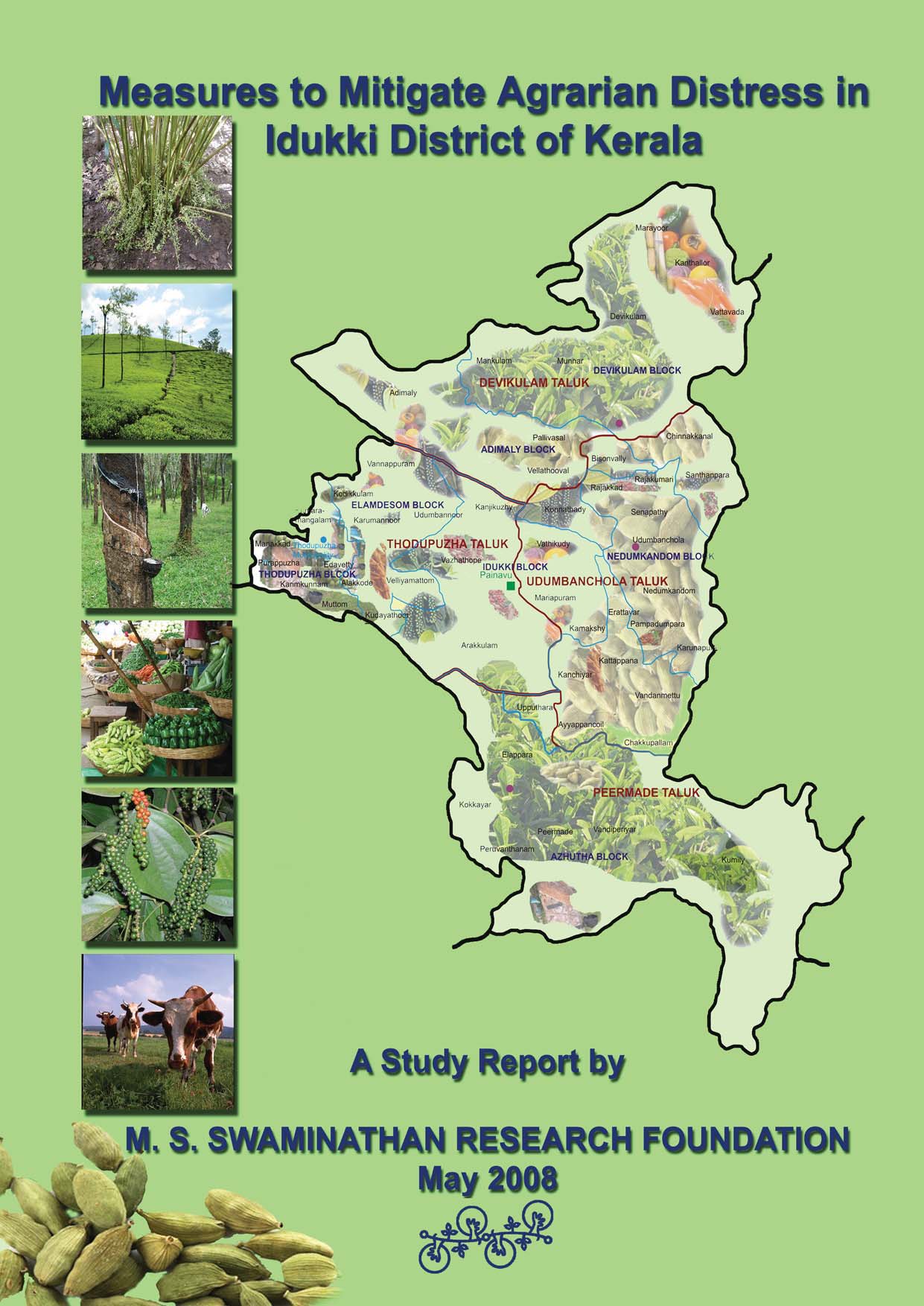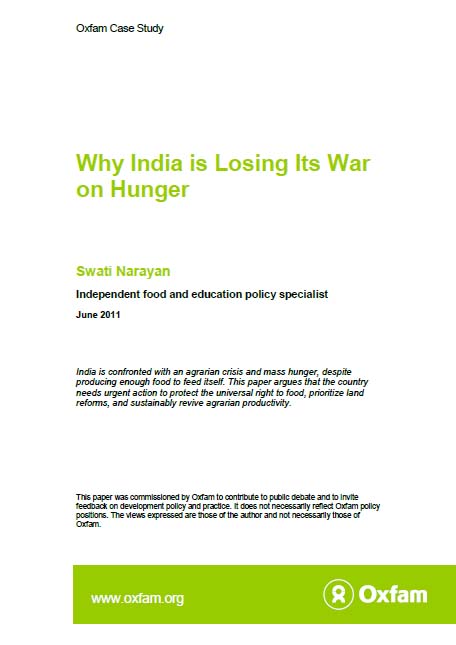/topics/society-culture-religion-and-history
Society, Culture, Religion and History
Conference on ‘Oral history and the sense of legacy’, Srishti School of Art, Design and Technology, July 19, 2011, Bangalore
Posted on 12 Jul, 2011 12:48 PMOrganizer: The Centre for Public History, Srishti School of Art, Design and Technology
Venue: National Gallery of Modern Art Auditorium, Palace Road, Vasanthnagar, Bangalore
Description:
The Centre for Public History, Srishti School of Art, Design and Technology, Bangalore, in association with the British Council, is pleased to announce a one-day conference titled “Oral History and the Sense of Legacy”. The conference will have invited presentations by experienced practitioners on key issues within oral history methodology.
Measures to mitigate agrarian distress in Idukki district of Kerala : A study report by MSSRF
Posted on 10 Jul, 2011 07:38 PM Although Idukki is generally perceived as a ‘spices district’ and a ‘plantation crop district’, about 95 per cent of the farmers here are small with tribal farmers constituting a substantial component. Public investment in agriculture in this district is very poor and this hampers agricultural progress and rural livelihoods in many ways.
Although Idukki is generally perceived as a ‘spices district’ and a ‘plantation crop district’, about 95 per cent of the farmers here are small with tribal farmers constituting a substantial component. Public investment in agriculture in this district is very poor and this hampers agricultural progress and rural livelihoods in many ways.
As a result of high cost of production of major crops and its volatile prices, small farmers who constitute the majority of the farming population have accumulated debt burden exceeding 700 crores. More than eighty per cent of this debt is due to crop loans to small and marginal farmers.
The recommendations in this report are made after giving due consideration to ongoing programmes and resources being made available thereof. These are mainly focused on the small, marginal and tribal farmers and other economically disadvantaged sections. The stress is on sustainability of agricultural production systems and strengthening the regional ecology.
Development flows from the barrel of a gun – A documentary by AKHRA
Posted on 08 Jul, 2011 10:37 AM
Directed by Biju Toppo and Meghnath, Hindi with English subtitles, 58 mins
Conflicts and dilemma of human right to water - A Current Science paper by J Harsha
Posted on 05 Jul, 2011 04:30 PM
Download the below attachment to read the entire article:
Fellowship media briefing workshop on water bodies, Centre for Science and Environment, July 26 – 27, 2011, Visakhapatnam
Posted on 04 Jul, 2011 01:14 PMOrganizer: Centre for Science and Environment
Venue: Visakhapatnam
Description:
Water is keenly contested today. Reports are emerging from across India about water bodies being encroached upon, gobbled up and sucked dry by a combination of forces ranging from industrialisation and urban growth to population pressures and severe pollution. A state of continuous conflict exists over these water bodies, lakes, rivers, reservoirs, streams and wetlands.
MP Government believes that thermal power plants are more important than farmers' livelihoods.
Posted on 04 Jul, 2011 09:41 AMA company is establishing a thermal Power project in the Niwari Block of Tikam Garh. It is one of the poorest and most backward districts of the country. Another agency has been engaged to the job of mediation and preparing the local farmers. Through their communication skills they are convincing the local population to sell their land. The plant will change the overall picture of the area. Not all promises will be fulfilled. They tell that if you give your land, you will get a free world class hospital, and the best education for your children.
It will need about 1500 to 1700 acres of land in Niwari Block of Tikam Garh about 35 km from Jhansi. Land acquisition has started and should be completed in one to two years time. Farmers are being told to cooperate, or their land will be taken by force. SDM Shri RK Gohat is telling the local people that an MOU has been signed between the company and the state government, and that the district administration has nothing to do with this.
Farmers are free to sell and negotiate. The Government has not decided any rate. These are small farmers. Their number will be around 1500. Some even have half a bigha land. Two hundred acres of land has already purchased. It is good agriculture land close to Pareechhka Dam in Jhansi, UP. There is already a power station at the dam. Jhansi is in UP and Tikam Garh is in MP. Distribution of power is yet not known. Orcha, famous tourist place is in Niwari Block.
Himalayan solutions for cooperation and security in river basins : A report by Strategic Foresight Group
Posted on 29 Jun, 2011 07:03 PM This report by the Strategic Foresight Group is a follow-up to its earlier report The Himalayan Challenge: Water Security in Emerging Asia, 2010 . The growing water stress, plans for dams on shared rivers, and uncertainties about the precise impact of climate change have brought water to the forefront of the political agenda of countries in the Himalayan River Basins.
This report by the Strategic Foresight Group is a follow-up to its earlier report The Himalayan Challenge: Water Security in Emerging Asia, 2010 . The growing water stress, plans for dams on shared rivers, and uncertainties about the precise impact of climate change have brought water to the forefront of the political agenda of countries in the Himalayan River Basins.
The report recommends policy options for national governments as well as strategies which can be implemented by local authorities and community groups in a politically viable manner. Some of the ideas may on the surface appear to be addressing micro-level issues. However, such micro-level issues do have an important bearing on security at the macro-level in a large continent such as Asia. This is the experience of many other regions as well, as illustrated in several of the chapters in this report.
The objective of this report is to explore how river basins in the Himalayan region, and particularly shared water resources, can foster cooperation and security between Bangladesh, China, India and Nepal. The conventional view is that depleting water resources, growing problem of pollution, uncertain risks posed by climate change together may lead to competition for resources, migration, social instability, internal conflicts and diplomatic tensions between countries. This view is realistic and was discussed in detail in a previous report of Strategic Foresight Group. It has contributed to spreading the awareness of security risks associated with water crisis in the Himalayan region.
Why India is losing its war on hunger – A case study by Oxfam
Posted on 29 Jun, 2011 08:50 AM The paper argues that the country needs urgent action to protect the universal right to food, prioritize land reforms, and sustainably revive agrarian productivity.
The paper argues that the country needs urgent action to protect the universal right to food, prioritize land reforms, and sustainably revive agrarian productivity.
India is home to a quarter of the world’s hungry people. Since the green revolution, the country has produced enough to feed itself, but it has not yet been able to wipe out mass hunger, which haunts the landscape of the countryside and lurks in the narrow alleys of urban slums.
Currently, 40 per cent of the population is malnourished – a decrease of only 10 per cent over the past three decades. Poor families, who spend more than 60 per cent of their incomes on food, are increasingly struggling to stretch their meagre household budgets. Unfortunately, small farmers have not benefited from high retail prices either, as they usually receive far less for their produce. In fact in the past 15 years, in an unprecedented wave, a quarter of a million farmers crippled by debt have chosen to commit suicide.
Hi-tech vs low-tech in the water sector in the village of Dandiganahalli near Bangalore - Article by S. Vishwanath
Posted on 28 Jun, 2011 05:40 PMEver since Schumacher wrote his now very, very famous book small is there has in my mind been a question of the appropriateness of the solutions we urban educated types posit for rural ‘problems’.
Centrally sponsored schemes ARWSP and TSC have not done enough to ensure right to water and basic sanitation : Article from Combat Law
Posted on 28 Jun, 2011 04:59 PMThe Universal Declaration of Human Rights (1948) recognises the inherent dignity and the equal and inalienable rights of all human beings. There are certain basic needs that are essential for a dignified life. Water and sanitation are two of these essential human needs and a clean environment is also increasingly recognised as a fundamental human right.





